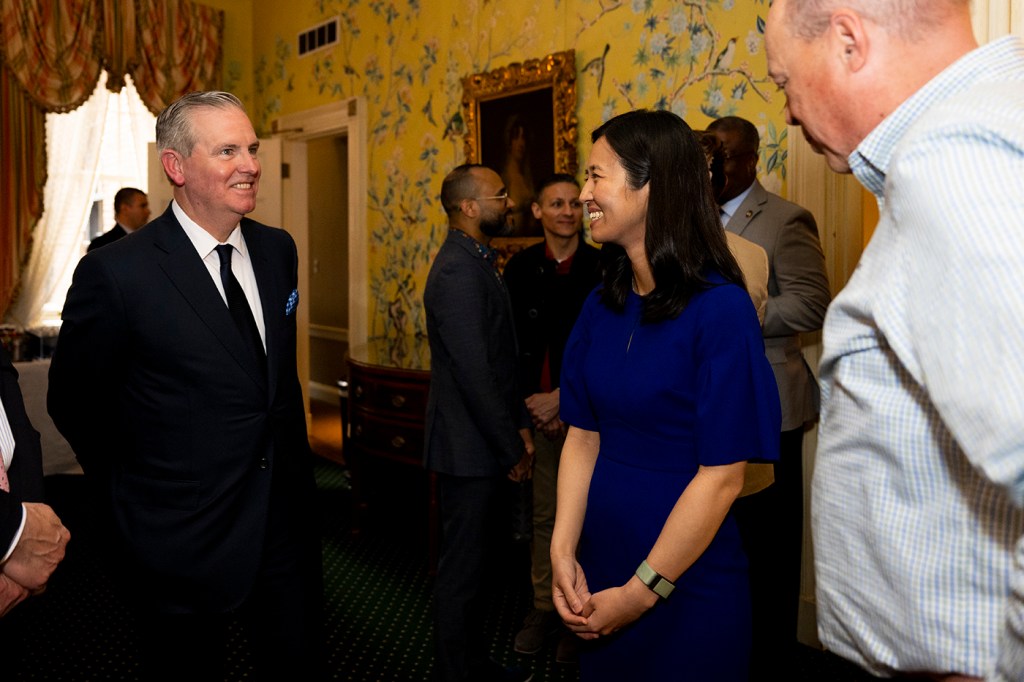Expert Advice: How to work a room with John Tobin
The Northeastern vice president of City and Community Engagement and former Boston city councilor shares tips for making small talk, navigating a crowd, and the social aspect of getting important work done.

When John Tobin first ran for Boston City Council in the mid-1990s, he made a crucial campaign stop at the Irish Social Club in West Roxbury. Feeling nervous, he found a familiar face and settled into a conversation at the back of the room, packed with 800 of the constituents Tobin hoped to represent.
It was comfortable, but it wasn’t going to win him an election — and his friend knew it. “After half an hour, he said to me, ‘John, you have my vote. You gotta get out there,’” recalls Tobin, now vice president of City and Community Engagement at Northeastern University.
Most of us can probably identify with the dread Tobin felt in that moment, faced with the task of charming a room full of strangers. But over the course of a career that has included five terms as a city councilor, 15 years advancing Northeastern’s interests and involvement with the city of Boston, and 20 years running standup comedy events, Tobin has become a (literal) pro at such interactions.
So we asked Tobin for his tips on working a room — whether you’re networking at a conference, canvassing for a political campaign or just trying to make it through your office holiday party.
1. Feeling scared? You’re not alone
Large groups are intimidating, even for the most extroverted among us. But for Tobin, empathy for that feeling can be a powerful social advantage. “The people you want to talk to are probably more scared than you are,” he advises. “They’ll probably be relieved you came over and said something.”
Avoid the impulse — a strong one — to stick close to the people you know, he suggests. “Come in, make eye contact, and ask, ‘Hi, may I say hello?’”
2. Be prepared
Whenever possible, Tobin does preemptive research. “Know the room as much as possible before you walk into it,” he says. “If you accept an online invite to a party or a meeting, check the RSVP list, then learn a little about [the people] on it.” That way, he says, you’ll have conversation topics at the ready going in.
It’s also a way to get a leg up on remembering people’s names, one of the hardest aspects of networking (during his time in and around Boston politics, Tobin knew one prominent politician who called everyone “Lefty” and another who called him “Guy” for years).
He also recommends having a few of your own talking points in mind beforehand: something as simple as a 30-second explanation of what you do for work, for example, or a funny fact about your hometown.
3. Let people tell their stories
“No matter how shy they are, people love talking about themselves,” Tobin says. “They like to brag about their kids, and in most cases they love to talk about where they’re from. Everybody’s got a great story.”
He’s found that especially true working at Northeastern, with its strong international contingent and top experts in a range of academic fields. “I can find myself talking to biochemists from France, but there’s almost always a piece of common ground [between us],” he says. “You just have to be open to asking about it.
4. Have a graceful exit strategy
Talking to a lot of people, of course, requires ending a lot of conversations. Tobin jokes that nowadays, that’s easier than ever. “Hold on, I’ve gotta take this,” he laughs, holding up his phone. But there are better, kinder ways, including making introductions between people and being mindful of when a conversation is exhausting itself. Additionally, some people may not want to talk at all — and that’s OK.
“I love talking to people, so I stay too long sometimes,” he says. “But it’s kind of like speed dating. You move on to the next table.”
5. Make the most of ‘extra time’
Working a room doesn’t have to happen exclusively at big events, according to Tobin. There are opportunities in smaller moments, too.
“Sometimes I think mingling before and after meetings is more valuable than what actually takes place during the meeting,” Tobin offers as an example. “People let their guard down. Or think about yourself being stuck in an elevator with nine other people. Someone’s got to break the ice.”
He adds that time permitting, seeking out extracurricular events can be a powerful way to connect, especially around the campus community. “Go to a hockey game or a musical performance. Go after work for a drink,” he says. “You’ll be surprised at the relationships you make.”
